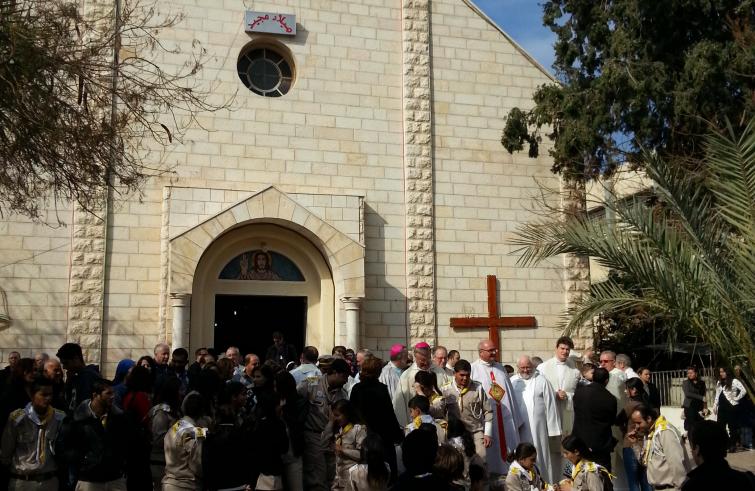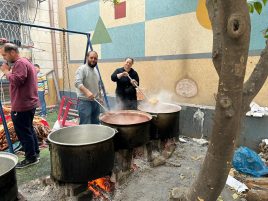
“The situation continues to deteriorate. There are bombings and raids in the Shejaiya neighbourhood, here in Gaza City, close to us. We hear the roar of bombs falling and the explosions leave shrapnel that endangers people’s lives, often falling close to our church. A few days ago, we decided to suspend our summer oratory activities. We had planned this initiative as a way to offer a few hours of recreation to the children who have taken refuge here in the parish, and to give some respite to their families”.
- (Foto Parrocchia Latina)
- (Foto Parrocchia Latina)
- (Foto Parrocchia Latina)
Father Gabriel Romanelli, the parish priest of the Church of the Holy Family, the only Catholic Church in Gaza, describes to SIR the situation in the Strip where hostilities are ongoing. The Israeli army issued an order for the evacuation of the eastern sector of Khan Yunis (south of the Strip) yesterday, and air raids began this morning. According to the United Nations Coordinator for Gaza, Sigrid Kaag, who addressed the Security Council on Tuesday, approximately 80% of Gaza’s inhabitants, or 1.9 million people, have been displaced. The Hamas-run Ministry of Health in the Gaza Strip has reported that approximately 38,000 people have been killed and more than 87,000 wounded in almost nine months of war.
Life in the parish. “We currently house about 500 people in the church premises. Some of them have permits to leave Gaza, but after the Rafah crossing was closed, they remained in the parish. It is unclear if and when they will be able to leave,” the priest said. Everyone’s safety is paramount: “Outdoor activities, including in the courtyard of the parish compound, have become too dangerous. As I said, bomb shrapnel and gunfire can happen at any moment. We also avoid cooking outside, which is the only way to prepare a warm meal. Here we only cook using firewood. There is no other alternative.
People spend their time in the church premises or in their rooms, inside, where they feel more protected. Very few people go outside the parish grounds, the risk of being killed or wounded is high.
 There is not a hospital here in the Strip that has not been seriously damaged. It is almost impossible to receive medical care. Father Romanelli is grateful to the Latin Patriarchate, which, he points out, “provides us with a tremendous amount of help, allowing us to continue to hold out and help those most in need. We distribute what we receive – water, food, medicines – not only to our Christians who are housed here and in the Orthodox parish, but also to many other Muslim families close by.” “Unfortunately,” he adds, “with each passing day, less and less aid is getting through because the borders are being controlled. Fruit and vegetables have not been available for about two months. We have some rice, flour and lentils. We manage to offer a meal to the displaced, but we lack basic necessities such as diesel fuel, which is vital for us because we need it to operate the well that supplies us with water and for the vehicles that we use in case of emergency, such as transporting the wounded or sick to hospital.”
There is not a hospital here in the Strip that has not been seriously damaged. It is almost impossible to receive medical care. Father Romanelli is grateful to the Latin Patriarchate, which, he points out, “provides us with a tremendous amount of help, allowing us to continue to hold out and help those most in need. We distribute what we receive – water, food, medicines – not only to our Christians who are housed here and in the Orthodox parish, but also to many other Muslim families close by.” “Unfortunately,” he adds, “with each passing day, less and less aid is getting through because the borders are being controlled. Fruit and vegetables have not been available for about two months. We have some rice, flour and lentils. We manage to offer a meal to the displaced, but we lack basic necessities such as diesel fuel, which is vital for us because we need it to operate the well that supplies us with water and for the vehicles that we use in case of emergency, such as transporting the wounded or sick to hospital.”
The Pope’s video-calls. The one thing that has brought some serenity and respite to the parish and its displaced faithful is the phone call from Pope Francis.
“The Pope,” says Father Romanelli, “never fails to keep his appointment with us. Every evening at 8pm, when it is 7pm in Italy, he calls us and encourages us, listens to us, prays for us, asks how we are”.
“If the Internet connection allows it, we can also see him by means of a video call. In this case, he greets the children and imparts his blessing on them. He really is one of us! We persevere in prayer with the Pope.”
We have no certainty about the future.
 The rumours circulating here about an agreement, a ceasefire, a truce are contradictory. Let us hope – says the parish priest – that there will soon be an exchange of prisoners, of hostages, and that there will be serious negotiations that will bring concrete results and relief to the suffering people. What we see and hear on the ground,” he concludes, “are the bombs and the fighting. Only weapons. There is a lack of aid and in many areas of the Strip people are hungry, thirsty, without medicine. It is for this reason that we continue to pray for peace”. This is also why the only parish activity that has continued uninterrupted during these months of war is preparing the wafers used for the daily Mass.
The rumours circulating here about an agreement, a ceasefire, a truce are contradictory. Let us hope – says the parish priest – that there will soon be an exchange of prisoners, of hostages, and that there will be serious negotiations that will bring concrete results and relief to the suffering people. What we see and hear on the ground,” he concludes, “are the bombs and the fighting. Only weapons. There is a lack of aid and in many areas of the Strip people are hungry, thirsty, without medicine. It is for this reason that we continue to pray for peace”. This is also why the only parish activity that has continued uninterrupted during these months of war is preparing the wafers used for the daily Mass.














